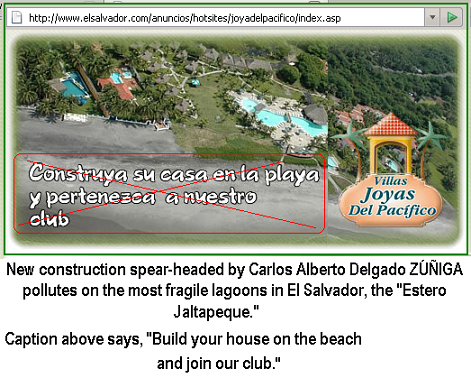
In April of this year, Markos Alberto Moulitsas ZÚÑIGA told La Prensa Gráfica, "I don’t have money. I don’t come from a famous or powerful family." Recently we have learned that none of this is true. In fact, contrary to what Moulitsas ZÚÑIGA has said, his family in El Salvador is wealthy and important enough to be one of the biggest environmental polluters of the Jaltepeque Estuary, where the family owns and operates a multi-million dollar hotel and subdividision conglomerate that is polluting a precious ecosystem.
The World Bank says, with specific reference to the tourism industry in the area where these hotels, clubs and subdivisions are being constructed,
Tourism in Jaltepeque generates income but has been developed with no coordination, regulation, or management, and has contributed significantly to degrading coastal resources in the area. In the Jiquilisco area tourism has been developed mostly through isolated, local initiatives with no clear promotion or management, leading to environmental problems such as waste and sewage accumulation, disruption of sea turtle laying and hatching by building too close to the beach, disruption of sea bird nesting, and landscape deterioration.
The rapid conversion of mangroves through illegal deforestation and fill operations constitutes a globally important threat. World Bank, p. 130.
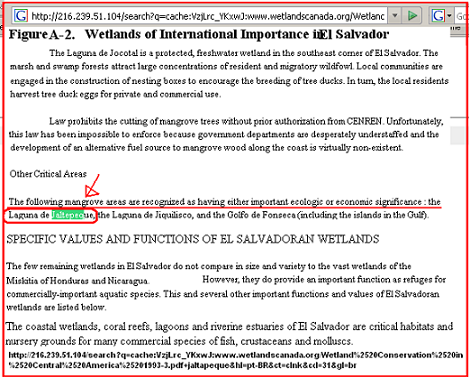
According to the Salvadoran Ministry of Tourism website, the "Costa del Sol" (Sun Coast) is 65 kilometers to the southeast of San Salvador, en the La Paz area.
Translated: "Located thirty minutes from the International Airport, the Sun Coast is the beach with the greatest tourist development in the country. Beautiful private homes, clubs, hotels and restaurants build on the oceanfront offer entertainment and value.
Particularly famous for its sunsets, this beach offers access to the Jaltepeque Estuary, where fishing, water-skiing, boat tours and bird watching in the natural mangrove habitat are daily activities." Salvadoran Ministry of Tourism
In an obscure reference in his wedding album, Markos Alberto Moulitsas ZÚÑIGA (M.A.M.Z) recounts the details of his honeymoon, acknowledging that his family is in the tourism business in El Salvador, specifically as owner of the Hotel Suites Jaltepeque, on the banks of the Jaltepeque Estuary. According to MAMZ online wedding album, "The Suites Jaltepeque is our family-owned hotel on El Salvador's Costa del Sol -- the largest uninterrupted beach in Central America. (. . .) The Costa del Sol is sandwiched between the Pacific Ocean and the Estero (estuary) de Jaltepeque. We also took a boat ride through some of the estuary's channels, and motored through a flock of hundreds of pelicans -- quite the sight!"
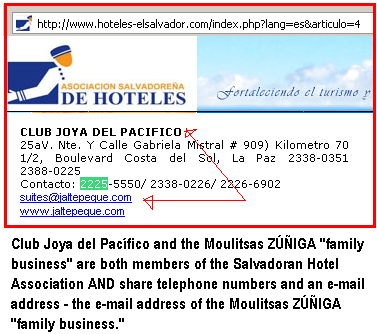
Tourism is big business in El Salvador. According to the Promoting Investment in El Salvador (PROESA) website, "During the year 2004, over 966,000 visitors arrived in El Salvador, generating $425 million and a growth of 13.4% with regards to the previous year." With associates placed at the very highest levels of the governance of El Salvador’s tourism industry, MAMZ’s family business is primed to do extremely well in the coming years, particularly by continuing the expand their hotel business on the banks of the endangered Jaltepeque Estuary.
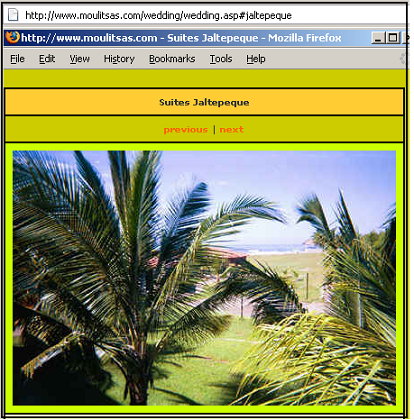
the Jaltepeque Suites Hotel, on the
banks of the Jaltepeque Estuary in El Salvador.
The Jaltepeque Suites Hotel shares a telephone number, e-mail address and contiguous property with the Club Joya del Pacífico (Jewel of the Pacific). Together, they are subdividing, developing, and destroying a crucial piece of environment that is internationally recognized as being endangered.
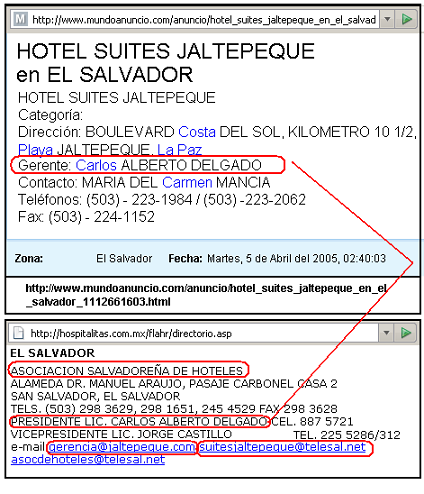
According to the environmental group Wetlands Canada,
In 1980, a study by the El Salvador National Parks and Wildlife Service estimated that more than 70% of the beaches have been divided into lots for recreational purposes. Development of these areas will be detrimental to adjacent wetlands that are perceived as wastelands and often cleared.
SPECIFIC VALUES AND FUNCTIONS OF EL SALVADORAN WETLANDS
The few remaining wetlands in El Salvador do not compare in size and variety to the vast wetlands of the Miskitia of Honduras and Nicaragua. However, they do provide an important function as refuges for commercially-important aquatic species. This and several other important functions and values of El Salvadoran wetlands are listed below.
The coastal wetlands, coral reefs, lagoons and riverine estuaries of El Salvador are critical habitats and nursery grounds for many commercial species of fish, crustaceans and molluscs. Mangrove forests provide timber and fuelwood for rural communities along the coast. Wetlands Cananda.Org
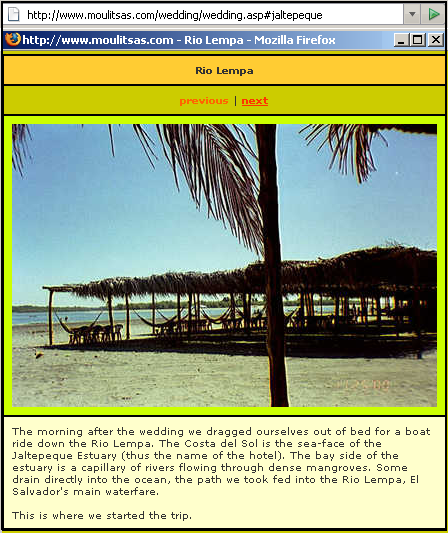
So, the wetlands and estuary surrounding MAMZ's family's Jaltepeque/Jewel of the Pacific hotel/club/subdivision conglomerate are internationally important and they are endangered. WorldWildlife.Org says:
The mangrove ecosystems of this Northern dry Pacific Coast ecoregion are a truly unique ecosystem and serve as the basis for most life in the surrounding environment. When the areas outside of this ecoregion begin to dry up and resources are scarce; the animals move into the mangrove ecosystem for refuge. This ecoregion supplies food from the most primary source up the food chain to complex carnivores.
Shelter is also a very important resource and is provided by the mangrove trees. Birds many different species living the mangroves year round and during the winter. Many bird species also nest in this ecoregion making it easier to raise their brood with so many available resource like invertebrate larvae, mussels, snails, fish fry, and other living things which help give the mangrove areas the representation of being nurseries to marine organisms. (…)
200 species of wildlife occur in near-shore marine and coastal areas of which 70 are threatened or endangered; are particularly concentrated around the estuaries. Mangroves provide protection, roosting and nesting sites to many waterbirds, while inlets and tidal flats are used as feeding grounds. Mangroves also provide critical habitat for the highly endangered white-fronted (Amazona albifrons) and yellow-naped parrots (A. auropalliata).
This unique ecoregion also holds the single most important bird nesting area, "Colegio de las Aves", a complex of mangroves, tidal creeks and flats, and small coastal streams associated with the Barra de Santiago estuary (Cotsapas et al. 2000). Some other representative birds for this ecoregion include reddish egret (Egretta rufescens), little blue heron (Egretta caerulea), great blue heron (Ardea herodias), sanderling (Calidris alba), sandpiper (C. mauri) and Wilson’s plover (Charadrius wilsonia).
Destruction and alteration of mangrove areas are the biggest threat to this ecoregion. The trees and other portions of the habitat are being destroyed and altered for tourism development, expansion of population centers, clearing for agriculture, over-grazing and construction of salt production ponds. WorldWildlife.Org
"In fact, the Central Costal Plane of El Salvador is the most extense by longitude and area, extending more than 100 kilometers, from Puerto de La Liberdad (Liberty Port) on the west, to the Bahia de Jiquilisco (Bay of Jiquilisco) on the east. The Central Coastal Plane includes the Estero de Jaltepeque (Jaltepeque Estuary) and the Bahia de Jiquilisco (Bay of Jiquilisco), considered the most extensive in the country, both with abundant mangroves and long sand beaches forward. These estuaries and their beaches are fed by three principal rivers: the Jiboa, Lempa and Grande de San Miguel, from the west to the east." Redmeso.Net
The Jaltepeque Estuary is universally recognized by environmentalists as a unique and precious internationally important ecosystem because of the rare birds and sea life in the estuary. Environmentalists from El Salvador and internationally, including the World Wildlife Fund, are working to defend and protect this precious and unique natural area.
But the estuary is extremely stressed biologically, because of increasing population in its watershed and polluted run-off and sewage from farms and new subdivisions along the banks of the Jaltepeque Estuary. The World Bank and many other organizations have recognized the environmental emergency. World Bank
The Northern dry Pacific Coast ecoregion extends in patches along the coastline of Guatemala and El Salvador. The mangrove ecosystems are concentrated on lagoons and estuaries, with brackish waters. For example there are patches of this ecoregion in the Bahia de Jiquilisco, Estero de Jaltepeque, Punta San Juan, Rio Paz, Rio Acome, and Rio Lempa estuaries and behind Barra de Santiago and Monterrico Lagoons.This ecoregion is a good example of how the combination of lagoon, bay, and river delta make the appropriate areas for mangrove growth. Many call this area Punta San Juan although the most notable river is said to be the Rio Lempa.
Destruction and alteration of mangrove areas are the biggest threat to this ecoregion. The trees and other portions of the habitat are being destroyed and altered for tourism development, expansion of population centers, clearing for agriculture, over-grazing, and construction of salt production ponds. EOEARTH.ORG
Population Environmental Research group says,
The rational and sustainable management of the mangrove ecosystem in El Salvador cannot be secured without a redefinition of entitlement rights and an examination of the mutual and overlapping concerns of those whose livelihoods are intimately connected to the health of the ecosystem.The failure to ensure that production and consumption activities are undertaken without internalizing the costs of degradation or redressing them has compromised the health of the mangrove ecosystem and undermined its productivity.
In the absence of measures to harmonize resource use and modify entitlements the activities of competing users are likely to result in irreversible damage to the ecosystem contributing to the further loss of biodiversity and undermining habitats and livelihoods. PopulationEnvironmentalResearch.Org
Another environmental study said,
Direct effects occur where anthropogenic [human] activities reduce the coverage and density of the mangrove ecosystem. Indirect effects have taken place where anthropogenic activities generate byproducts or externalities that impact upon the health of the mangrove ecosystem. This may occur at source or at some distance from the activity itself. The extensification of farming, logging and salt-production which has consumed land adjacent to the mangroves, interrupted existing drainage patterns and cleared the mangroves for alternative uses. Population, Consumption and Environmental Degradation in a Mangrove Ecosystem in El Salvador, (p.4)
Even as environmentalists call for increased protection of this estuary to preserve its life for future generation, aerial images and commercial websites show that MAMZ’s family is building a new subdivision and condominiums right on the banks of the estuary, inevitably contributing to the congestion and pollution that are killing the estuary itself.
Making matters worse, Carlos Alberto Delgado Zúñiga, "manager" of the Hotel Suites Jaltepeque owned by MAMZ family, is also head of El Salvador’s national tourism board, and a board member of the National Association of Private Corporations (ANEP). He is using his exalted position in El Salvador’s business community to create a new legal framework in El Salvador that devolves responsibility for environmental protection to the owners of the land, which in this case includes MAMZ family, so that development (and pollution) will take precedence over environmental protection. Club Pacific Jewel
The Wise Coastal Practices for Sustainable Human Development Forum says:
There is a real need to strengthen those institutions that define the rules and regulations governing the extraction and use of the mangroves at the national and local level. This requires the effective and full participation of communities and local actors as well as public and private sector institutions. The research findings drew attention to significant deficiencies in existing legislation and in the design and operation of policy. The recommendations highlight the need for concrete directives that establish parameters for the management of coastal resources and the use and conservation of the mangroves Wise Coastal Practices for Sustainable Human Development Forum
But, Carlos Alberto Delgado ZÚÑIGA is extremely influential and important in Salvadoran business circles nationally, because he is a board member of the Asociaión Nacional de Empresa Privadas (National Association of Private Corporations) (ANEP). Prisma2.Org., says of ANEP:
La Asociación Nacional de la Empresa Privada (ANEP), es la gremial con mayor protagonismo en las esferas de la vida política, económica y social de El Salvador desde su fundación en los años sesenta.Translated: The National Association of Private Corporations (ANEP) is the lobby with the greatest force in political, economic and social life of El Salvador since its founding in the 1960’s. Prisma2.Org
Carlos Alberto Delgado Zúñiga's self-interested behavior is a text-book case of corporate lobbying to put venal financial interests above the needs of the environment.
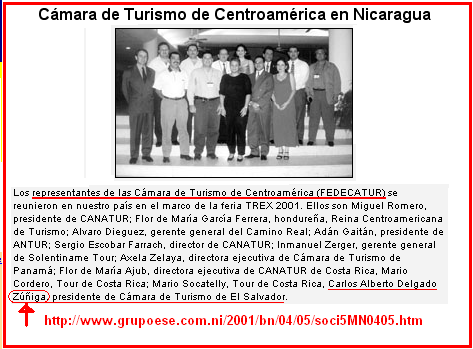
Even having read this far, some supporters of Markos Alberto Moulitsas ZÚÑIGA will insist that the pollution of unique natural resources in El Salvador is irrelevant to politics in the United States, even when this pollution is paid for with millions of dollars of financing from the US Treasury. People who hold this perspective are free to ignore or inveigh against this report, as they certainly will.
Others among us (myself included) believe that the commercial and environmental behavior of our political leaders should be consistent with their publicly announced positions, and so we take environmental pollution by political leaders and/or their families very seriously, particularly if we believe that our leaders stand to gain economically from this pollution. In 2004, MAMZ correctly pointed out the "crimes against the environment" by the Administration in Washington.
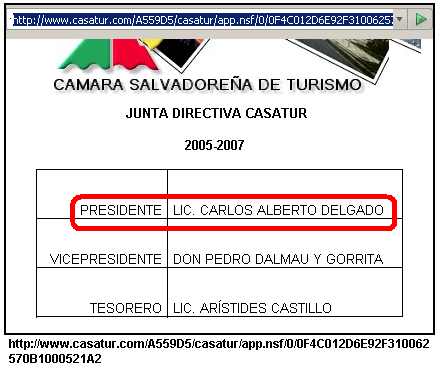
In light of the environmental behavior of MAMZ’s own family business in El Salvador, the question is: If MAMZ’s own family is an example of crimes against the environment, and if MAMZ himself stands to benefit financially, then is MAMZ the right individual to "crash the gates of the Democratic Party," and put our Party on track for creating a better environment here in the United States?
Can supporting leaders whose public statements are directly at odds with their own family commercial behavior really lead to better government in Washington? Is following the leadership of hypocrites really going to make Washington a better place?
In cases of environmental pollution, matters of cause and effect, proof and the appropriate balance between development and preservation are always complex and contentious issues. There is also a question of fact here, whether MAMZ benefits financially in the present from this destruction of the environment, and whether he will benefit in the future from the construction of this vast estate? Those are questions that need to be answered, not ignored.
Whatever the case, the entire international community has issued its judgment: These already-wealthy hotel interests are putting profit before ecology and destroying a precious ecosystem.

Even as they pollute the environment in search of higher profits, the upper strata of Salvadoran society and governance are integrally related to the US Government and industry, a result of "anti-communist" efforts to blunt popular revolutionary movements on the 1970’s and 1980’s. USAID says in a report entitled, "EL SALVADOR: BIODIVERSITY, TROPICAL FORESTRY AND WATER RESOURCES ASSESSMENT" that:
Background on the USAID Program in El Salvador
The U.S. Government has a long history of assistance to El Salvador. Some would argue that "there are few examples in the world where the aid of one country has been so intimately linked with the policies, economy and institutions of the other, as in the case of the cooperation of the United States to El Salvador" (authors’ translation from Barry 1993).(p.27)
During the long years of civil war, U.S. support for El Salvador amounted to the very significant sum of US$4.5 billion, including both economic and military assistance. Among the achievements of that period was setting up the network of private sector NGOs, led by the Salvadoran Foundation for Socio-Economic Development (FUSADES), which served to transform, reform and modernize the more economically powerful elements of society in ways that were essential steps toward resolving the basic social conflicts behind the war (ibid). USAID assistance has remained critical
in many ways as a guarantor of the ambitious economic and social sector reforms that were the result of negotiated peace process. (p 10.)
The report further states that, (consistent with US Republican Party and corporate policy,) the US Government’s approach to protecting the environment is that, rather than support the Salvadoran government in land-use restrictions, the US supports economic payments (pay-offs) to private business to influence them in favor of environmental protection. (If it does’t help the environment get cleaner, at least it helps the businesses get richer.) USAID says, "A survey of the baseline for two conservation areas – Los Volcanes and Jiquilisco-Jaltepeque – is being carried out. The management interventions for which payment for environmental services are being considered include sustainable agriculture, reforestation, agroforestry and soil and water conservation, all emphasizing the importance of water resources." USAID, (p.27)
USAID says, "The principal pressures on the natural areas under consideration are the advance of the agricultural frontier, poverty and the conflicts with local communities, settlements and illegal colonization, erosion and soil degradation, burning and forest fires, unregulated extraction of resources, and the destruction of marine and coastal ecosystems. These pressures lead to the following impacts: loss of wildlife and biodiversity resources and the loss of environmental goods and services that limit their eventual possibilities for socio-economic development." (Emphasis added.) USAID, (p.30)
However, USAID’s strategy to pay off wealthy Salvadorans in favor of the ecology doesn’t seem to be working, since Carlos Alberto Delgado ZÚÑIGA’s Joya de Pacífico resort, which is right on the banks of the Jaltepeque Lagoon, is still advertising on international websites for its new residential subdivisions on the banks of the Jaltepeque Lagoon, even as the lagoon itself is dying from pollution.
But the forces promoting tourism and other development at the expense of conservation have very powerful friends. Precisely because of the tension between nature preservation and tourism, Carlos Alberto Delgado ZÚÑIGA has had to exert himself in many of El Salvador’ forums to gain and concentrate as much political power as he could in his own hands, in order to win the battle against the national and international ecological groups who sought to limit the growth of tourism in order to preserve fragile ecosystems.
So, as president of the national hotel association, and also president of the "Cámara Salvadoreña de Turismo" (CASATUR) (the Salvadoran Tourism Board), and sitting, effectively, on the Board of the Asociaçión Nacional de Empresas Privadas (ANEP) (The National Association of Private Corporations), Carlos Alberto Delgado ZÚÑIGA has endeavored successfully to pass a "law of tourism" in El Salvador that would clarify the primacy of tourism (his business) over the interests of ecology. See Note 27.
With Carlos Alberto Delgado ZÚÑIGA at the helm of the relevant tourism industry boards, other areas recognized as crucial to the environment have been designated by the Salvadoran Government as protection areas, but the Jaltepeque Estuary, where ZÚÑIGA has his business, has not. World Bank Environmental Study
The United States Government advocates a highly ironic and convoluted approach to these tensions between the corporate polluters of natural water resources and those who depend upon those resources. With wealthy business interests polluting the nations water resources, the World Bank and the National Association of Private Enterprises propose that the ownership of drinking water resources should be privatized, and user fees from the drinking water should be aggregated and used to pay wealthy landowners to stop polluting the water. World Bank, Table 2.2.1
The Environmental Services Project provides payments to landowners whose land use practices contribute to the conservation and restoration of lands supporting globally significant biodiversity. World Bank, p. 112
Because the Jaltepeque Estuary includes some of the most important environmental diversity in El Salvador, Jaltepeque polluters would be among the main beneficiaries of the World Bank payments program. First these hotel interests get rich polluting the water, and then they will get paid again to stop polluting the water. And the money to pay them will come from the poor, who will have to pay user fees for their drinking water. World Bank, p.116, Table 2
These arrangement for these payments to be maide to wealthy members of the Salvadoran oligarchy is very useful to the United States, because it helps to keep El Salvador open and prone to US investments. According to the Salvadoran newspaper LaPrensaGrafica.Com, the US Government has provided 470 million dollars for the development of key industries in El Salvador, including tourism, energy, financial services and others, with the purpose being "to identify new opportunities for investment by US corporations in Central America." LaPrensaGrafica.Com
And then wealthy and influential members of the oligarchy, who control the Salvadoran Government, advocate not only for their own interests but also for the interests of US corporations wanting to do business in El Salvador. In 2002, ANEP presented no less than FIFTY legislative proposals for El Salvador whose purpose was to "accelerate free trade and Central American integration in search of greater competitiveness," and "consolidate and institutionalize the free market in the context of globalization. "
Among these proposals, (returning now directly to the matter of polluting the Jaltepeque Estuary), the "Law of Tourism" which directly affected the business interests of Carlos Alberto Delgado ZÚÑIGA, even as he was advocating as president of multiple business associations to put this law into place.
The "Law of Tourism" makes it clear that the very corporations that own land containing precious and unique ecosystems – NOT the Salvadoran Government – will decide how to preserve the land for tourism, and NOT necessarily for ecological purposes:
Art. 8.- Los recursos naturales, arqueológicos y culturales que integren el inventario turístico del país, serán preservados y resguardados por las instituciones a quienes legalmente correspondan tales atribuciones. Las entidades y organismos del Estado o de las municipalidades que tengan la atribución legal de autorizar construcciones, edificaciones o cualquier otro tipo de infraestructura, estarán obligadas a respetar y mantener la vocación turística de tales recursos y las de su ámbito de influencia, para lo cual las construcciones, edificaciones e infraestructuras que se autoricen deberán ser compatibles con los elementos necesarios para el desarrollo turístico de las mismas.
Translated: Article 8. The natural, archeological and cultural resources that are part of the country’s tourism inventory will be preserved and protected by the institutions which own these resources. The entities and organisms of the State or fo the municipalities empowered to authorized construction, buildings and whatever other sort of infrastructure that they authorize shall be compatible with the elements necessary for the TOURISM development of these resources. Salvadoran Government: Law of Tourism (Emphasis added.)
The business groups led by Carlos Alberto Delgado ZÚÑIGA are radically changing the Salvadoran legislative framework that governs their activities in order to promote globalization, privatization, and increased corporate freedom from government regulation, through the new "Law of Tourism":
The legal incentives included in the recently approved Law of Tourism, the projected Law of Services, Law of Investments, Law of Free Trade Zones and Commercialization, as well as the Law of Customs Simplification. OFFICIAL PROESA WEBSITE
But the legislative goals of the business groups led by Carlos Alberto Delgado Zúñiga run directly counter to the preservation necessary for the survival of the Jaltepeque Estuary and the mangrove habitat.
The rational and sustainable management of the mangrove ecosystem in El Salvador cannot be secured without a redefinition of entitlement rights and an examination of the mutual and overlapping concerns of those whose livelihoods are intimately connected to the health of the ecosystem. The failure to ensure that production and consumption activities are undertaken without internalizing the costs of degradation or redressing them has compromised the health of the mangrove ecosystem and undermined its productivity.
In the absence of measures to harmonize resource use and modify entitlements the activities of competing users are likely to result in irreversible damage to the ecosystem contributing to the further loss of biodiversity and undermining habitats and livelihoods. Consumption and Environmental Degradation (p.2)
Groups led by Carlos Alberto Delgado Zúñiga have stacked the legal deck in favor of developers and tourism interests, making it clear that the "redefinition of entitlement rights" will benefit wealthy developers, not environmental preservation.
I've always believed there had to be a good reason why Markos Alberto Moulitsas ZÚÑIGA has repeatedly and consistently lied to his supporters, journalists and the rest of America about his family’s background in El Salvador. With this report, we learn what one more of those reasons is.


3 comments:
Thank you for the nice post.
Thank you, John! Your encouragement after this post was very helpful!
This waas lovely to read
Post a Comment